Converging for the first time in an all-virtual format, more than 2,700 professional registrants joined the Society’s 57th Annual Meeting, January 29-31. To read articles from the STS Daily Bulletin, visit sts.org/annual-meeting-archive.
Keynote Lectures Explored Adversity, Disparities, Innovations, Solutions
Innovation can be viewed as a discipline, one that can be studied, taught, and reproduced, said Paul G. Yock, MD, MA, from Stanford University in California, during the C. Walton Lillehei lecture at STS 2021. Dr. Yock described the challenge facing clinical inventors as appealing to an “eight-headed monster”—patients and physicians, hospital administration, lawmakers, insurance companies and other reimbursement entities, regulating organizations, and the press. He also gave an overview of the program at the Stanford Byers Center for Biodesign, which deploys multidisciplinary teams of students and inventors to evaluate real-world needs in clinical settings, invent new health technology to address those needs, and give that technology the best shot at actually making it to clinical practice.
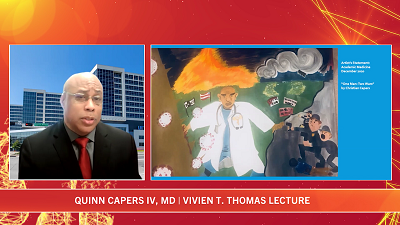
During the Vivien T. Thomas lecture, Quinn Capers IV, MD, discussed racial disparities in medicine.
During the Vivien T. Thomas lecture, Quinn Capers IV, MD, from The University of Texas Southwestern in Dallas, delivered a powerful message—and spurred thoughtful questions and discussions—as he illuminated racial disparities in medicine and demonstrated why those disparities must be challenged.
Dr. Capers provided evidence-based examples of how systemic racial inequality impedes the health care field, and he also confirmed that a more diversified medical workforce improves patient care. Strategies to combat inequality in medicine include engaging “gatekeepers” such as school counselors, admissions faculty, mentors, and role models, Dr. Capers explained. More than 400 participants joined the live lecture and discussion, a sign that the STS community is ready for uncomfortable but necessary conversations that will ultimately benefit the medical field.
The Thomas B. Ferguson lecture was presented by Craig R. Smith Jr., MD, from Columbia University and NewYork-Presbyterian Hospital in New York City; Enrico Ruffini, MD, from the University of Torino in Italy and the European Society of Thoracic Surgeons; and Alan D.L. Sihoe, MD, MA, FRCSEd, from Gleneagles Hospital in Hong Kong. These renowned surgeons, each from their respective large city, described their personal and professional experiences as the COVID-19 pandemic took hold, and they shared lessons learned while they were working on the front lines.
STS President Rallied CT Surgery to Mobilize, Evolve in Year of Extraordinary Challenges
Along with the rest of the world, the cardiothoracic community faced a global pandemic, social injustice, political divide, and natural disaster in the past year, acknowledged Joseph A. Dearani, MD, as he described his own obstacles and heartbreaks in a moving Presidential Address that featured clips of him and his band performing Charlie Chaplin’s “Smile.”
Standing still and not operating can feel like prison for cardiothoracic surgeons, who are accustomed to a fast-paced work environment and lifestyle, said Dr. Dearani. He echoed the frustration and heartbreak that the specialty faced in the past year, from the millions of COVID-19 deaths worldwide to the systematic horrors of racial disparities that were brought searingly into the public eye. He cited disheartening survey results that suggest more than half of physicians are suffering from burnout and that some are even experiencing career choice regret.
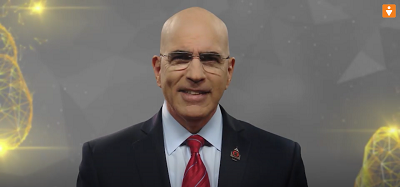
Joseph A. Dearani, MD, celebrated the resilience of cardiothoracic surgery professionals in his Presidential Address, "Resilience. Hope. Unity."
“Physicians around the country have experienced record changes in work hours. Too many for some, and too little for others, as is the case for surgeons who are estranged from operating rooms, due to the forced triage and delay of surgery for non-urgent situations,” Dr. Dearani said. “This is a tricky business in cardiothoracic surgery, since nothing is really elective, but rather shades of urgency.”
Yet within those challenges are opportunities to find innovative new ways to be a voice for all patients, he offered. The personality of the cardiothoracic surgeon is resilient and gritty, he said, and “our efforts cannot be sidelined because of unexpected challenges like COVID and physician burnout.”
Dr. Dearani further observed that, while the specialty has been accustomed to in-person meetings and workshops “with bitter coffee and bad muffins,” and while he and his peers miss those days, perhaps those traditions aren’t essential for professionals to bond and learn.
Perhaps most importantly, the virtual learning environment has helped to amplify the voices of those who are less likely to speak up, he said. Dr. Dearani noted that he now has learned and remembered the names colleagues who he may not have had a chance to meet previously and has observed that many individuals who wouldn’t have come to the microphone in a crowded lecture hall don’t hesitate to speak up on virtual chat boards.
In concluding his address, Dr. Dearani offered motivating and inspiring words to the cardiothoracic surgery community: “We are part of one of the most impactful and gratifying specialties in all of medicine. The year 2020 was a very difficult one for all of us; but, I’m certain we’ve learned some things and we’ve grown closer together. And, in the end, we’ll be better doctors, better nurses, better professionals—we’ll be better human beings.”
Immersive Video Experiences Provided 360° Views of Master Surgeons’ ORs
On the meeting’s opening day, registrants who purchased Immersive Video Experiences were treated to panoramic and up-close views of five challenging cardiothoracic procedures from beginning to end.
Surgeons and advanced practice providers walked participants through each case and provided live feedback for an experience that was nearly like standing beside the team in the operating room.
The sessions demonstrated how surgical procedures are a “team sport,” said Robert J. Cerfolio, MD, MBA, from NYU Langone Health in New York City. During the robotic-assisted segmentectomy, viewers were able to see how intravenous access was optimized safely with a peripheral line, how the anesthesiologist handled assembly and placement of the double lumen tubing, how the team worked together to identify and extract lymph nodes, how robotic instruments and camera angles were maneuvered for precise viewing angles, and how the team saved valuable moments when repositioning the patient.
The series also featured “deep dive” sessions on 11 adult cardiac, congenital, and general thoracic topics, including transseptal puncture for surgeons, atrioventricular replacement strategies in neonates and infants, minimally invasive esophagectomy, Ross and Ross-Konno procedures preventing neoaortic root dilatation, and navigating initial nights on call as a resident.
If you already purchased the Immersive Video Experiences with registration, all 16 videos are available in the STS Learning Center. They also are available for purchase separately or in a bundle with Annual Meeting Online (see page 12).
Fun Run, Peloton Rides Brought the Virtual Team Spirit
The Thoracic Surgery Foundation raised more than $31,000 in pledges and donations for its 5k Fun Run & Walk, which was held in conjunction with STS 2021.
Runners and walkers submitted their best times and competed virtually via a live leaderboard. Amy G. Fiedler, MD, from UW Health in Madison, Wisconsin, and Connor Callahan, MD, from Washington University in St. Louis, Missouri, claimed first place. The 23-runner “Cardinal Chest Cutters” team from Stanford University in California, led by captain Leah M. Backhus, MD, MPH, was presented with the Team Spirit Award.
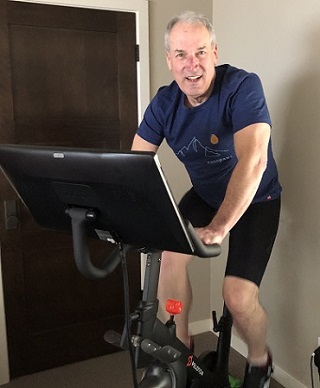
Douglas E. Wood, MD, dominated the leaderboard during the #STSPelotoners group cycling rides.
Each day of the meeting also kicked off with a group Peloton ride, and participants personally challenged and supported one another and contended fiercely for time and distance.
Douglas E. Wood, MD, from UW Medicine in Seattle, Washington, emerged atop the leaderboard for two of the rides during STS 2021, though he was unseated on Day 2 by Nate Airhart, MD, from UCLA Health in Los Angeles, California. More than 70 participants joined the Peloton competition, with riders sharing how they were inspired by colleagues across the world via the #STSPelotoners hashtag.
STS 2021 Stayed Social in a Virtual Environment
In addition to outstanding science, education, and technology, one of the most beloved aspects of the STS Annual Meeting is the ability to connect with colleagues, so STS treated attendees to a well-deserved weekend of social activity with live virtual events.
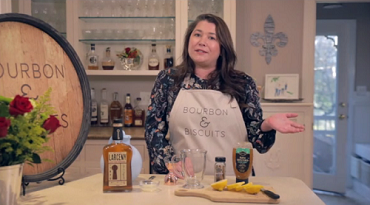
The virtual “Bourbon with a Surgeon" event showed attendees how to master the art of cocktail making from home.
Each morning began with wellness activities, including bodyweight high-intensity interval training workouts, a mindfulness lounge, yoga, and tips on relieving stress and getting a good night’s sleep.
Friday and Saturday evenings offered a stellar lineup of entertainment and inspiration—an improv show by the famed Chicago comedy troupe The Second City, discussion with the first woman to kayak the Amazon, and the epicurean sessions “Bourbon with a Surgeon” and “Guac with a Doc.” And “Team Mackdizzle”—the family of Ryan A. Macke, MD, from Banner Health in Gilbert, Arizona—dominated the family-friendly trivia competition.
Shark Tank Delivered Excitement of Live Competition with Front-Couch Seating
The STS 2021 Shark Tank was a fast-paced competition, featuring technologies from seven different representatives, including a left atrial appendage occlusion device, an endovascular net prosthesis, augmented reality and artificial intelligence software for the operating room, a detachable-head aortic cross clamp, and a mobile communication app that can help improve referral, retention, and recovery for organ transplantation.
The session was moderated by T. Sloane Guy, MD, MBA, of Thomas Jefferson University Hospital in Philadelphia, Pennsylvania, and Usman Ahmad, MD, of the Cleveland Clinic in Ohio. William E. Cohn, MD, from Johnson & Johnson Medical Devices Companies, and Sidharta (Sidhu) P. Gangadharan, MD, from Beth Israel Deaconess Medical Center in Boston, Massachusetts, served as “sharks,” asking tough questions about potential competition and marketing challenges.
The live audience submitted questions about the products and voted on whether they would purchase them for their practice. The winning technology, earning a 42% vote, was the Breethe Oxy-1 system, presented by Bartley P. Griffith, MD. This compact cardiopulmonary support system features an integrated oxygen concentrator that provides an independent oxygen source to help patients move around during therapy.
Award Winners Honored for Remarkable Achievements
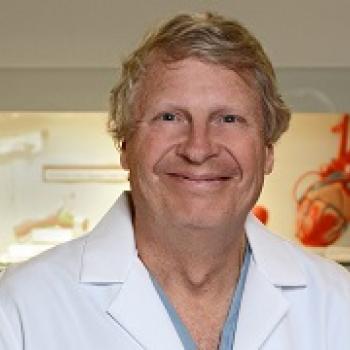
Distinguished Service Award
The Distinguished Service Award recognizes individuals who have made significant and far-reaching contributions to STS and the specialty. This year, Alan M. Speir, MD, was honored for his steadfast leadership and commitment to cardiothoracic surgery advocacy.
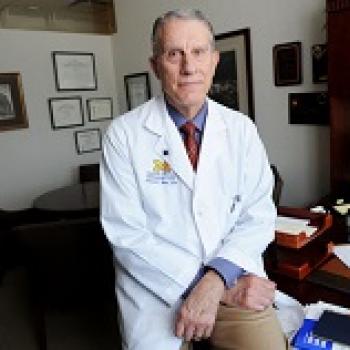
Earl Bakken Scientific Achievement Award
An innovator and influencer in the field of pediatric congenital heart surgery, Edward L. Bove, MD, was presented with the Earl Bakken Scientific Achievement Award. The Bakken Award honors individuals who have made outstanding scientific contributions that have enhanced the practice of cardiothoracic surgery and patients’ quality of life.
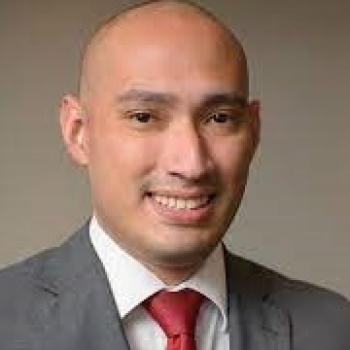
President's Award
Rodrigo A. Zea-Vera, MD, from Baylor College of Medicine in Houston, Texas, received the 2021 President’s Award, for his paper, “Artificial Intelligence Reliably Predicts Outcomes and Cost after Isolated Coronary Artery Bypass Grafting.” Selected by the STS President, this award recognizes an outstanding scientific abstract by a lead author who is either a resident or a surgeon 5 years or less in practice.
Annual Meeting Research Makes Headlines
During STS 2021, the Society released four recorded press briefings featuring some of the top research from the meeting:
‘COVID Effect’ Leads to Fewer Heart Surgeries, More Patient Deaths
Researchers: Tom C. Nguyen, MD, from the University of California San Francisco, and colleagues
Main finding: COVID-19 resulted in a substantial decline in overall heart surgery volume and an unexplained increase in deaths after coronary artery bypass grafting.
ERAS Program Expedites Recovery for Congenital Heart Surgery Patients
Researchers: Nathalie Roy, MD, and colleagues from Boston Children’s Hospital in Massachusetts
Main finding: Select patients born with heart defects and who undergo congenital heart surgery recover with few complications and reduced opioid use when a comprehensive, evidence-based enhanced recovery after surgery program is used.
Women Undergo Less Aggressive Open Heart Surgery, Experience Worse Outcomes than Men
Researchers: Oliver K. Jawitz, MD, from Duke University in Durham, North Carolina, and colleagues from Duke and The Johns Hopkins University School of Medicine in Baltimore, Maryland
Main finding: Women are significantly less likely than men to undergo coronary artery bypass grafting using guideline-recommended approaches, which may result in worse outcomes after surgery.
Black Lung Cancer Patients Die Sooner than White Counterparts
Researchers: Chandler Annesi, from Boston University School of Medicine in Massachusetts, and Michael Poulson, MD, and colleagues from Boston Medical Center in Massachusetts
Main finding: Residential segregation and its socioeconomic effects prevent a large proportion of black patients from receiving appropriate lung cancer care, resulting in worse outcomes and shorter lifespans than white patients with the disease.
These studies generated interest from media outlets such as The Washington Post, US News & World Report, the Philadelphia Inquirer, United Press International, HealthDay, TCTMD, and the Pulmonology Show on SiriusXM Doctor Radio.
For more information on the Society’s media relations efforts, visit sts.org/media.
Access STS 57th Annual Meeting Online
If you were unable to attend the virtual Annual Meeting, or if you are looking for online learning opportunities, you now can purchase access to STS 57th Annual Meeting Online.
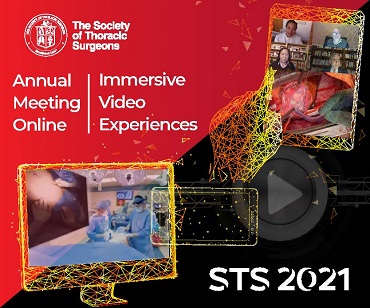
This product offers more than 90 hours of educational sessions—including practice-changing research, thought-provoking lectures, pro/con debates, and cutting-edge techniques and technologies—and the ability to earn up to 89.25 CME credits. Annual Meeting attendees receive free access to Annual Meeting Online. The Immersive Video Experiences series, which offers the opportunity to earn up to an additional 20 CME credits, can be purchased separately. More details are available at sts.org/AMOimmersives.